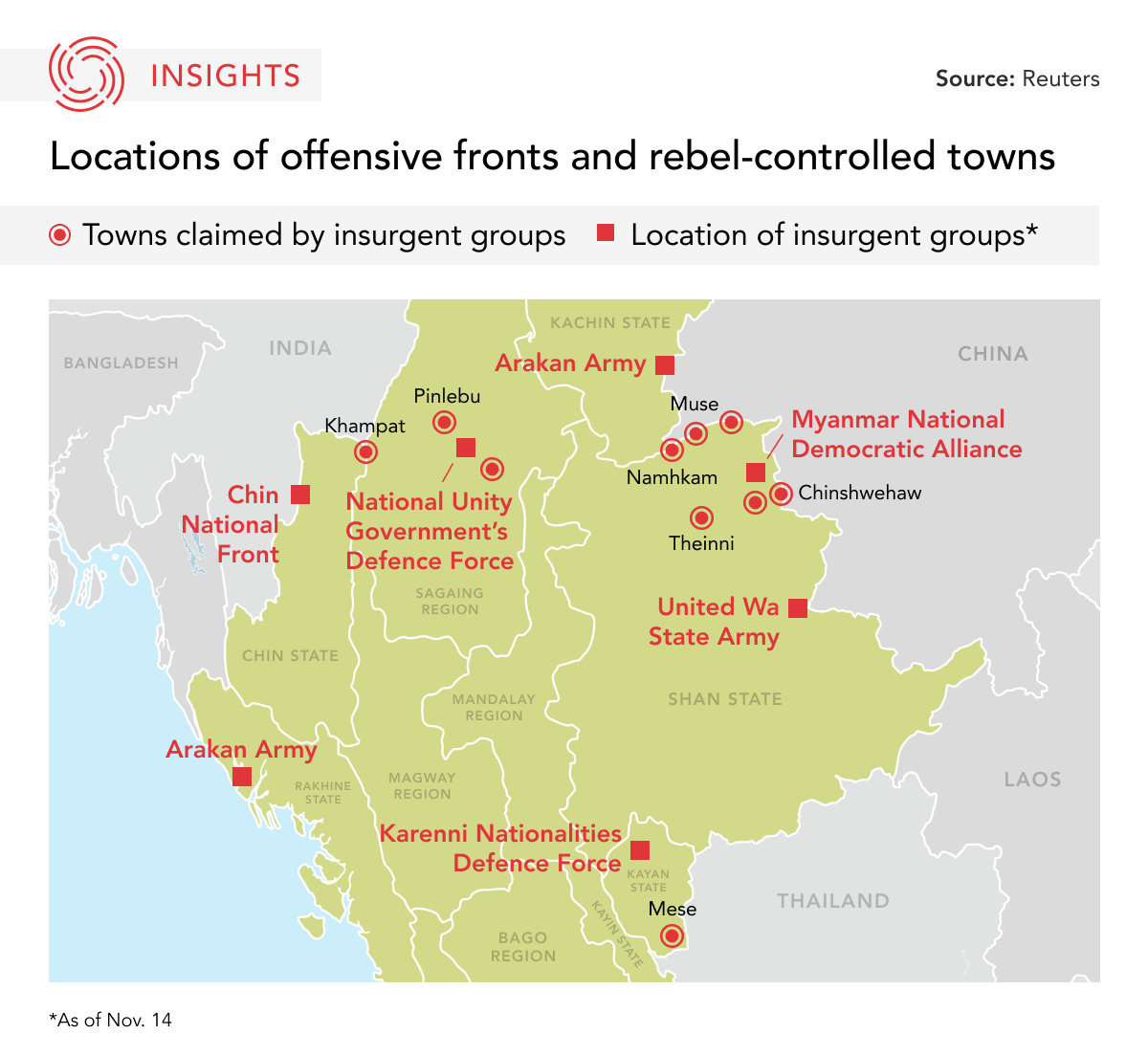The Takeaway
On October 27, a coalition of three ethnic armed organizations in Myanmar launched a joint attack against junta forces in Shan State, Mandalay Region, and Sagaing Region. The attack drew support from the National Unity Government and several other ethnic armed organizations. Less than two weeks later, several Karenni ethnic armed organizations launched their own joint attack in Kayah State. A third front has recently opened, extending the fighting to the Chin and Rakhine states in western Myanmar. The attacks present the most significant challenge to the junta since February 2021, when it overthrew Myanmar’s democratically elected government.
In Brief
- At the onset of the initial attack, the coalition, also known as the Three Brotherhood Alliance (3BHA), released a statement outlining its objectives, including safeguarding civilian lives from junta attacks, protecting and continuing self-governance of areas under 3BHA control, and defeating the State Administration Council, the junta that has governed Myanmar since the February 2021 coup. The 3BHA also outlined its goal of combating online gambling fraud in northern Shan State, which predominantly operates along the China–Myanmar border.
- In northern Shan State alone, the 3BHA claimed it seized 168 junta outposts and military positions. Junta forces in the region also experienced massive losses, with at least 298 soldiers killed, including Aung Kyaw Lwin, the commander of the Tatmadaw’s 99th Light Infantry Division and the highest-ranking officer to die in combat since the 2021 coup. Additionally, more than 400 junta soldiers have surrendered. In one instance on November 12, an entire infantry battalion, consisting of 127 soldiers and 134 of their family members, surrendered to 3BHA forces.
- In Chin State, 43 junta soldiers reportedly crossed into India to flee a rebel attack that ultimately led to the seizure by rebel forces of the junta-controlled Rihkhawdar and Khawmawi military camps. Thirty-nine of those soldiers have since been repatriated and handed back to the junta. Meanwhile, in Kayah State, Karenni ethnic armed organizations allied with the 3BHA captured a junta outpost in Mese Township near the Thai border. Fighting has also broken out in Loikaw, the capital of Kayah State, with Karenni forces capturing Loikaw University, which previously housed a junta military base. During the fighting, Karenni forces claimed to have killed at least 110 junta soldiers, in addition to capturing 38.

Implications
Martial law has been enacted in parts of the country. Following significant military and territorial losses, on November 8, junta leader and head of the Tatmadaw, Min Aung Hlaing, convened an emergency meeting with his National Defence and Security Council. During the meeting, junta-appointed president Myint Swe warned that the ongoing conflict could splinter the country. Several days later, martial law was declared in eight townships across northern Shan State and 50 other towns and cities across Myanmar including Yangon and Mandalay.
Trade disruptions have prompted the Chinese government to call for a ceasefire. Trade with China was impacted after 3BHA forces took control of areas close to the China–Myanmar border. The impacted areas include vital trade routes and major highway intersections. Major border towns such as Chinshwehaw, which facilitate trade between the two countries, have come under 3BHA control. Fighting is also ongoing near Muse, where the conflict has halted cross-border trade. These two towns alone facilitated about US$1.77 billion in trade over the past eight months, raising concerns with China. Chinese officials, including State Council member and Minister of Public Security Wang Xiaohong and Assistant Foreign Minister Nong Rong, have made recent visits to Myanmar to discuss the deteriorating situation at its border. On November 2, China called for a ceasefire.
What’s Next
- ASEAN defence ministers call for an end to ‘humanitarian crisis’
The UN estimates that, since October 26, approximately 23,000 people have been displaced in northern Shan State due to heightened conflict between the Myanmar Armed Forces and various ethnic armed groups. The UN has also reported that Myanmar nationals have fled the attacks by crossing into China. On November 15, the 17th ASEAN Defence Ministers’ Meeting was held in Jakarta where the region’s defence chiefs, in a joint statement, urged an end to “all violence” in Myanmar and lobbied for the implementation of the ASEAN Five-Point Consensus peace plan, brokered in April 2021. Myanmar’s junta has consistently disregarded the principles of that peace plan and has failed to implement it.
- Sanctions against Myanmar
On November 16, the International Court of Justice (ICJ) issued a statement noting support from Canada — and six other countries, including the U.K. — for Gambia’s ICJ case accusing Myanmar of genocide. Gambia, leading the case, has accused Myanmar of committing genocide in Rakhine State against the country's Rohingya minority. Two weeks earlier, on October 31, Ottawa announced that as part of its broader strategy with the U.K. and the U.S., it would enforce additional sanctions on the junta, building on sanctions applied following the 2021 coup.
- Extension of the state of emergency
The military’s state of emergency is currently set to expire in February 2024. Constitutionally, elections must be held within six months after the lifting of the state of emergency, but the junta could use this as an opportunity to extend the state of emergency yet again and maintain its grip on the country.
• Produced by CAST's Southeast Asia team: Hema Nadarajah (Program Manager); Alberto Iskandar (Analyst); and Saima Islam (Analyst). Edited by: Ted Fraser. Design by: Chloe Fenemore.




